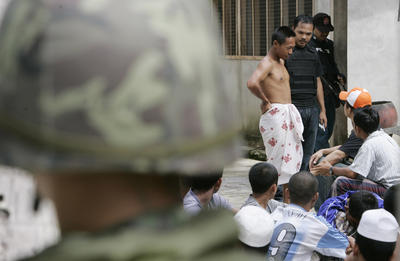While it is too soon to know whether her government will succeed in implementing systemic change — or even whether it is interested in doing so — Thailand faces many challenges to ensuring greater protection of human rights.
When the Council for Democratic Reform under the Constitutional Monarchy (CDRM) launched the September 2006 coup, one of its first actions was to abrogate Thailand’s 1997 constitution. The council then released a temporary constitution comprised of 39 articles, including two that ensured the CDRM’s protection from criminal prosecution. On the fifth anniversary of the 2006 coup seven progressive law lecturers at Thammasat University, a group known as the Khana Nitirat, issued a statement taking up Articles 36 and 37 of this constitution, which secured impunity for the coup’s leaders. They began by noting: ‘The 19 September 2006 coup was an illegal act. The coup destroyed the rule of law and democracy. The coup remains the primary cause of political conflict from then until the present’.
The Khana Nitirat argued that the coup and its effects should be ‘nullified’, by which they meant voided and the resulting legal actions and consequences overturned. Their goal was not to pave the way for Thaksin’s return, as some critics charged, but to facilitate a return to the rule of law. On the issue of accountability for wrongdoing during the Thaksin government, the Khana Nitirat also noted that their suggestions ‘do not constitute an amnesty or a pardon or an absolving of those individuals accused of wrongdoing … Therefore, new cases can be started against those relevant individuals in accordance with the standard legal process’. In the remainder of the statement, the Khana Nitirat called for a review of the country’s lèse-majesté laws, protection of the rights of all detainees and prisoners and for a new constitution. The statement was harshly criticised by some segments of the armed forces and the opposition Democrat Party.
The instigators of the 2006 coup enjoy a level of impunity that is particularly startling when considered alongside the recent prosecution of Suderueman Malae, a victim of torture. Suderueman was sentenced in August this year to two years in prison for having spoken out against his alleged torturers. Suderueman and four others were accused of stealing guns in Narathiwat province on 4 January 2004, detained under the terms of martial law and initially charged with ‘attempt to kill’. While under detention, they were tortured and pressured to confess. Suderueman’s lawyer, Somchai Neelaphaijit, prepared a complaint detailing their torture, which he submitted to the Department of Special Investigation (DSI) on 11 March 2004. The next day, Somchai disappeared.
While the initial ‘attempt to kill’ charge against Suderueman was eventually dropped, Thailand’s legal framework provides few options for lodging formal complaints against state security officials. Thailand’s National Anti-Corruption Commission (NACC) in the end dismissed Suderueman’s complaints against Police Lieutenant General Bhanupong Singhara Na Ayuthaya and 18 other police officers involved in his arrest and detention.
But in a development emphasising the distinct shortcomings of Thailand’s current human rights framework, two police officers chose to bring legal charges against Suderueman for allegedly filing a false statement to the DSI and NACC.
Based partly on the NACC’s investigation, Thailand’s Criminal Court found there was no evidence to support Suderueman’s complaint against one of these officers, Police Major General Chakthip. The court convicted Suderueman and sentenced him to two years in prison for maliciously giving false information to inquiry officers. Suderueman has been freed on bail while he files an appeal against the decision. But his case draws attention to the clear sense of impunity with which Thailand’s elite sometimes act — and the impact this has on other citizens’ basic human rights. Not only is it difficult to hold state security officials to account under Thai law, but attempts to do so may even result in further ill treatment.
As long as military officers can launch coups without sanction and torturers cannot be held to account, the prospects for human rights in Thailand will remain bleak, regardless of who holds government and occupies the position of prime minister.
Tyrell Haberkorn is a recent PhD graduate in Southeast Asian Studies from Cornell University and is now Research Fellow in Political and Social Change in the College of Asia and the Pacific at ANU.
This article appeared in the most recent edition of the East Asia Forum Quarterly, ‘Where is Thailand Headed?‘.


Seventy nine years (1932-2011) after the end of absolute monarchy, a huge amount of work still remains to be done in Thai political development towards democratization. If anything, hatreds are growing and political tension is increasing. But, in one respect, huge progress has been made. Because of WikiLeaks, investigators have succeeded in finding out the truth about the death of King Ananda and who was responsible. This was not known by the Thai people and the international community throughout the postwar and the Cold War period. When it is understood that Thai military coup d’état, the death of King Ananda, and Thai political tensions are correlated with international politics, Tyrell Herberkorn’s writing and analysis about Thai politics from the perspective of rule of law alone seems rather naïve.
Through World War II, the postwar period, the Cold War, and the post-Cold War and post-9/11 hegemonic challenge period, Thai politics has been directly intertwined with world politics. Without the persoective of strategic studies Tyrell Herberkorn’s article is an example of analysis from an area studies background that can only provide the simplest analysis of Thai politics. For example, the 1932 Coup d’état was staged when Pridi Banomyong realized that King Prachadhipok had made an agreement to ally Siam with the Axis Forces – Imperial Japan and Nazi Germany. The meeting to forge an alliance between King Prachadhipok with Hitler and Hirohito prior to 1932 and in 1934 (pictures available worldwide) was not even been mentioned in Herberkorn’s writing about the 1932 coup d’état.